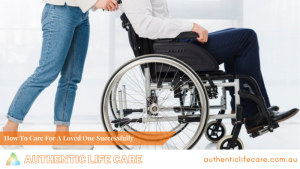Coping with a sudden illness or handicap is never easy. Your life will change in many ways, and the transition time may be difficult. You may feel disoriented and shaky in the first few days, weeks, or even months if you become too focused on what you’ve lost in the process.
Here’s something to keep in mind: it’s perfectly normal, and you’re not alone.
Your anxieties and negative feelings are understandable after being diagnosed with a serious illness, but you must remember that you always have power over how you react. There will always be something you can do to improve your situation. By expanding your level of independence and introducing yourself to new experiences that will empower you, you can strive toward self-improvement.
No matter what kind of illness or disability has befallen you, you can still live a full and happy life. Here are some tips to help you cope with your condition and thrive. These aren’t quick remedies, but with enough time and care, they can help you get over the stumbling blocks in your path with considerably less difficulty.
How to live with a disability and thrive
1. Allow yourself to grieve.
It’s fine not to be sad. You don’t have to force yourself to be happy; in fact, if you do, you can end up doing more harm to your mental health. You’re acutely aware of how your handicap or sickness has affected your body right now. You may have lost some physical or cognitive abilities, and you may find that tasks that were once simple are now difficult for you in a variety of ways.
Ignoring your feelings isn’t a good idea. The best course of action is to go through your feelings and allow yourself to grieve. There’s also a good probability you’ll go from one emotion to the next. Ups and downs are perfectly normal, and it’s critical to allow yourself to feel whatever feeling you’re experiencing without criticising yourself.
At this stage, you might want to consider counselling or speaking with a psychiatrist. A certified therapist or psychiatrist can assist you in coping with your emotional upheaval and teach you how to manage your emotions.
2. Acknowledge and accept your impairment.
It’s no easy task to come to terms with a disease or disability. You may be tempted to reminisce about the days when you were free of this load, but you must strive to remember that you must concentrate on finding ways to adjust to your new “normal condition.”You’ll be one step closer to acceptance if you do this.
Maybe you can’t see anymore, or you’ve lost your hearing or ability to walk. Perhaps you’ve been diagnosed with a mental disease that makes it impossible for you to function normally in society. New hope may arise from seeking out others who have similar stories to see how they are managing and thriving despite their disability.
3. Reduce the impact of your disability on your daily life.
The unexpected development of disease or handicap has changed your life. Fight for your rights and needs with tenacity. Learn as much as you can about your impairment and what resources you may use to ease your load.
Consider what you can still accomplish despite your constraints. There are methods and technologies that can assist you in making things easier. For example, if you are now confined to a wheelchair, reaching high shelves at home may be impossible. You can adjust your living space’s fixtures and cupboards to make them more accessible to you.
4. Keep your attention on the present.
To be able to move forward, you must be able to focus on the present moment. Worrying about the future and thinking back to a time when you were free of any sickness or impairment will do little to help things improve.
Getting healthier necessitates adopting a mindset that is focused on reaching attainable objectives. Patience is a virtue, therefore rejoice in every small win or step forward you make each day.
5. Discover hobbies and interests that make you happy.
Staying engaged can be as simple as picking up new interests or participating in new activities. Finding something you enjoy will greatly enhance your mental health and give your life new meaning and purpose.
6. Be willing to accept assistance.
Perhaps you’re just starting out on your road to physical recovery and require temporary home care while you get back on your feet. Always remember that your illness or the adaptive aids you require do not define you. It is not shameful to seek assistance in order to better manage your situation.
7. Look after both your mind and your body.
You will be able to perform at your best if you take care of your mind and body. For people who are dealing with any form of health problem, eating healthy with a diet rich in fruits and vegetables is very vital. Improving your mental health, anxiety, stress, and sleep quality by boosting your immune system through a good diet and exercise is a win-win situation.
Never, ever, ever give up on yourself. You should never let an unexpected sickness or disability prevent you from enjoying a life you are proud of. Developing tools and coping processes will offer you the ability to frame the circumstance in a way that allows you to live with your new reality. It will take a lot of effort, but it is possible. Seeking expert assistance will put you on the road to recovery.
Hold on and believe that things will get easier for you as time goes on.




